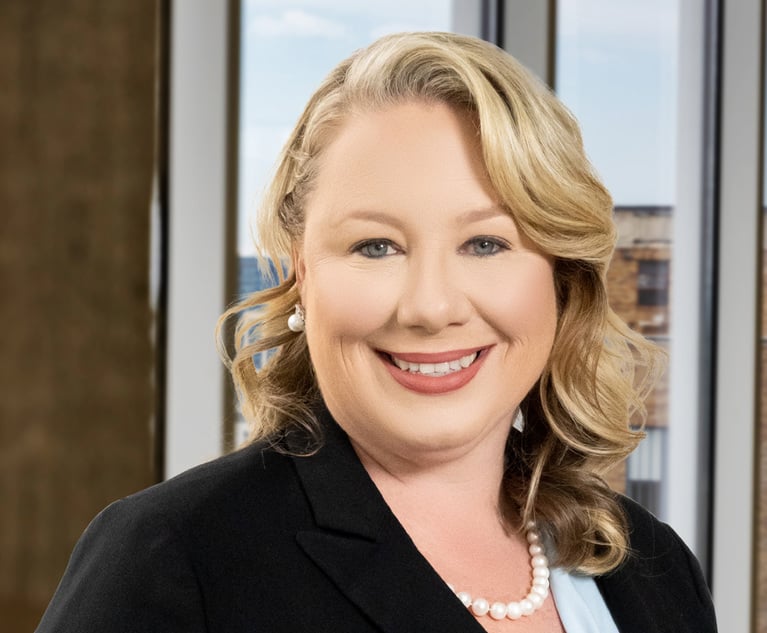Employers Can Take These Steps When Workers Return (or Don't) After Extended Medical Leave
Here is a breakdown of steps companies can take to ensure a smooth transition and make sure the biggest risks are mitigated.
June 20, 2024 at 06:36 AM
6 minute read
Commentary Sherry Culves or Parker Poe. (Courtesy photo)
Sherry Culves or Parker Poe. (Courtesy photo) Employers often grant employees extended medical leave, either as a result of the company's benefits policies, accommodations under the Americans with Disabilities Act (ADA) or entitlement for leave under the Family and Medical Leave Act (FMLA) or other applicable state laws. When these employees are ready to return to work or the deadline that was set at the beginning of their leave is coming up, employers need to be ready. Sometimes, these employees will not come back on time as scheduled, sometimes they don't come back at all, and other times they want to return but are not capable of performing their duties exactly as they had before. Companies should be prepared to know how to approach these delicate situations.
The following is a breakdown of steps companies can take to ensure a smooth transition and make sure the biggest risks are mitigated.
Understand the Employee's Entitlement to Leave
For employees that qualify, the FMLA gives workers the right to take up to 12 weeks of unpaid, job-protected leave for specified family and medical reasons. This leave comes with the continuation of the same health insurance coverage as if the employee never took leave. Certain state employees are now entitled to 240 hours of paid parental leave for qualifying events. Company policies can entitle employees to prescribed sick and personal leave benefits. Under the Georgia Family Care Act, employees who received paid sick days from their employers can use up to five of those days to care for a family member, not just for their own illness. But it's the ADA's right to reasonable accommodations that gives most employers the biggest challenges when navigating an employee's request for extended leave beyond those base requirements.
Use Interactive Process With Employees on Leave
Employers should be discouraged from granting open-ended leave or open-ended extensions to leave. Instead, companies should give defined periods of approved time off with a clear return date when an employee requests leave.
Once an employee's legal entitlement to leave (such as under the FMLA) is used up, employers are under no obligation to automatically continue providing more time off. However, if an employee's request for extended leave is a result of their own disability, employers should engage in the interactive process under the ADA to determine if a reasonable accommodation would allow a defined period of extra leave for the employee to recover before returning to work. In some cases, it simply is not reasonable to do so based on the disruption the extended leave would cause to the company's needs and operations. In other cases, an extension of leave is feasible. The key is the interactive process and exploration of what works and what doesn't. If an extension is appropriate, employers should set a defined amount of extra leave time and a deadline for the employee to return. Extensions should never be open-ended. Employers should likewise explore an option for employees who could return to work with an accommodation that would allow them to perform their essential work duties.
What Happens if Employees Do Not Return From Leave?
Occasionally, employers will grant leave to employees who "no show" or don't return on the day both parties had agreed to.
Employers are under no obligation to assume that this worker needs an additional accommodation. That accommodation is only triggered when an employee engages with the company and expresses a continuing disability that is impacting their ability to return.
When employees do not show back up for work after leave, employers should follow their policies when it comes to disciplinary and termination actions related to workers abandoning their jobs or not following procedures for reporting to work.
Employers should also be proactive and clearly spell out in their policies and in their letters granting the initial leave what happens in these situations, including the consequences for not returning.
What's Required of Employers When Workers Return From Leave?
If a worker was on leave for a disability or another health incident for a long period of time, it is a good idea for employers to require a clearance from a doctor before they return to work.
Workers who underwent back surgery and perform a job that requires them to lift heavy objects, for example, could easily reinjure themselves upon returning to work. This, in turn, could lead to expensive workers compensation claims. To avoid these costly situations, employers should seek out a clearance from the worker's doctor that specifically states that the worker is ready to come back and perform the essential duties of their job. Sharing the job duties with the doctor is a critical component to success.
When workers are not cleared to come back and do their jobs, employers should then engage with the employee to determine if there's a reasonable accommodation to allow them to come back. That could look like the employer modifying the employee's duties. Employers could also decide that the worker needs more time to recover. If after exhaustion of these processes and exploring all reasonable accommodations there's no way to accommodate the worker, a decision can then be made to terminate the worker.
Other Steps Employers Can Take After Workers Return From Leave
An employee who returns to work after leave with different duties can be a big deal for companies, large and small. This can lead to managers and supervisors switching around roles to ensure operations continue normally. It is important to communicate any changes immediately with the employee's direct supervisor.
Employers should take seriously creating a culture where supervisors are not only aware of any accommodations upon return, but that they are instructed not to harass or otherwise discriminate an employee who is working on some sort of limited basis compared to their prior role. Employers should not share the employee's personal health information, just the accommodations.
Employers should also be utilizing systems to track each employee's leave schedule, including the dates when they're ready to come back. This can help companies stay proactive when it comes to communicating with these employees in the days leading up to their return and create a timeline of other parties they need to connect with, such as doctors, if needed.
Sherry Culves is a partner at Parker Poe in Atlanta. Her practice addresses some of the most pressing and complex needs of companies, including fair dismissal, employment disciplinary actions and discrimination claims.
Interested in writing? Daily Report welcomes guest-written materials and invites readers to submit commentaries, letters to the editor and ideas for news coverage across the spectrum of the legal landscape. Contact [email protected] for more information.
This content has been archived. It is available through our partners, LexisNexis® and Bloomberg Law.
To view this content, please continue to their sites.
Not a Lexis Subscriber?
Subscribe Now
Not a Bloomberg Law Subscriber?
Subscribe Now
NOT FOR REPRINT
© 2025 ALM Global, LLC, All Rights Reserved. Request academic re-use from www.copyright.com. All other uses, submit a request to [email protected]. For more information visit Asset & Logo Licensing.
Related Stories
View AllYou Might Like
View All

CFPB Proposes Rule to Regulate Data Brokers Selling Sensitive Information
5 minute read
Law Firms Mentioned
Trending Stories
- 1Adobe’s Chief Cyber Legal & Privacy Officer Talks Managing Gen AI Risks, Cyber Training
- 2The M&A Partners Who Drove the Most Business as Deal Leads Last Year
- 3Recent Ford Bronco Battery Recall Draws Pa. Class Action
- 4Office of Special Counsel Chief Challenges Firing 'Without Cause'
- 5'Supervisor Is a Bully:' State High Court Weighs Liability for Campaign Against Appellate Staff Attorney
Who Got The Work
J. Brugh Lower of Gibbons has entered an appearance for industrial equipment supplier Devco Corporation in a pending trademark infringement lawsuit. The suit, accusing the defendant of selling knock-off Graco products, was filed Dec. 18 in New Jersey District Court by Rivkin Radler on behalf of Graco Inc. and Graco Minnesota. The case, assigned to U.S. District Judge Zahid N. Quraishi, is 3:24-cv-11294, Graco Inc. et al v. Devco Corporation.
Who Got The Work
Rebecca Maller-Stein and Kent A. Yalowitz of Arnold & Porter Kaye Scholer have entered their appearances for Hanaco Venture Capital and its executives, Lior Prosor and David Frankel, in a pending securities lawsuit. The action, filed on Dec. 24 in New York Southern District Court by Zell, Aron & Co. on behalf of Goldeneye Advisors, accuses the defendants of negligently and fraudulently managing the plaintiff's $1 million investment. The case, assigned to U.S. District Judge Vernon S. Broderick, is 1:24-cv-09918, Goldeneye Advisors, LLC v. Hanaco Venture Capital, Ltd. et al.
Who Got The Work
Attorneys from A&O Shearman has stepped in as defense counsel for Toronto-Dominion Bank and other defendants in a pending securities class action. The suit, filed Dec. 11 in New York Southern District Court by Bleichmar Fonti & Auld, accuses the defendants of concealing the bank's 'pervasive' deficiencies in regards to its compliance with the Bank Secrecy Act and the quality of its anti-money laundering controls. The case, assigned to U.S. District Judge Arun Subramanian, is 1:24-cv-09445, Gonzalez v. The Toronto-Dominion Bank et al.
Who Got The Work
Crown Castle International, a Pennsylvania company providing shared communications infrastructure, has turned to Luke D. Wolf of Gordon Rees Scully Mansukhani to fend off a pending breach-of-contract lawsuit. The court action, filed Nov. 25 in Michigan Eastern District Court by Hooper Hathaway PC on behalf of The Town Residences LLC, accuses Crown Castle of failing to transfer approximately $30,000 in utility payments from T-Mobile in breach of a roof-top lease and assignment agreement. The case, assigned to U.S. District Judge Susan K. Declercq, is 2:24-cv-13131, The Town Residences LLC v. T-Mobile US, Inc. et al.
Who Got The Work
Wilfred P. Coronato and Daniel M. Schwartz of McCarter & English have stepped in as defense counsel to Electrolux Home Products Inc. in a pending product liability lawsuit. The court action, filed Nov. 26 in New York Eastern District Court by Poulos Lopiccolo PC and Nagel Rice LLP on behalf of David Stern, alleges that the defendant's refrigerators’ drawers and shelving repeatedly break and fall apart within months after purchase. The case, assigned to U.S. District Judge Joan M. Azrack, is 2:24-cv-08204, Stern v. Electrolux Home Products, Inc.
Featured Firms
Law Offices of Gary Martin Hays & Associates, P.C.
(470) 294-1674
Law Offices of Mark E. Salomone
(857) 444-6468
Smith & Hassler
(713) 739-1250







